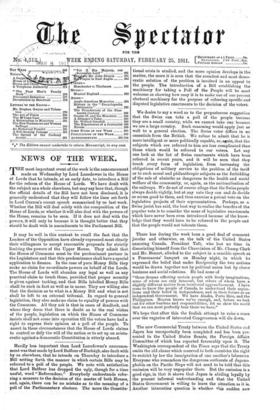We desire to say a word as to the preposterous
suggestion that the Swiss can take a poll of the people because they are a smell country, while we cannot take one because we are a large country. Such reasoning would apply just as well- to a general election. The Swiss voter differs in no essentials from the British. We refuse to admit that he is more intelligent or more politically capable, or, again, that the subjects which are referred to him are leas complicated than those which would be referred to our voters. Let auy one look at the list of Swiss enactments which have been referred in recent years, and it will be seen that they touch _every form of legislation, from increasing the obligations of military service to the problem of the tariff or to such moral and philanthropic subjects as the forbidding of the sale of absinthe as dangerous to the health and social welfare of the community, or, again, as the nationalisation of the railways. We do not of course allege that the Swiss people always decide rightly, but at any rate they can and do decide as seems good to them, and thus exercise a potent veto on the legislative projects of their representatives. Perhaps, as a Swiss jurist has said, the best way to realise the benefits of the popular vote is to consider the mass of legislative enactments which have never been even introduced because of the know- ledge that they would have to be referred to the people and that the people would not tolerate them.






































